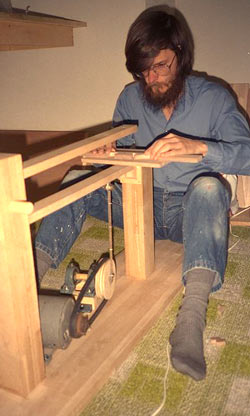Woody Friend (II)
(continued from last week)
When I first received requests to sell some of the toys I was making for my children and their friends, I declined to do so. The toys were just a hobby activity; I made them because they were something that my children needed. Our income came from the English classes that I held in our home a few days a week. The general idea was that I would gradually improve my printmaking skills to the point where I would be able to start selling woodblock prints. (Although honestly speaking, there was really no firm plan for this, because it seemed like a completely impossible dream at that time.)
The requests continued to come though, many of them accompanied by quite handsome offers of payment. It started to seem as though the production of these simple playthings for my children could actually turn into some kind of business. One woman in particular was very insistent about this, and put forward a proposal; she would act as a travelling salesman, getting out and selling the toys, while I would remain at home and produce them, paying her a percentage of the sales as a commission. One wouldn't think that simple wooden toys would provide enough revenue to make this worthwhile, but she suggested some quite high prices, upwards of 10,000 yen for each of my basic kana and alphabet puzzles, and she managed to talk me into it.
 And so we began. She prepared a simple illustrated catalogue of the toys, using her own children as models, began visiting kindergartens and day care centers all around the area, and was soon sending me a steady stream of orders. Up to this point I had been crafting each toy and puzzle completely with small hand tools, but that was no longer possible. I couldn't afford to buy large scale power tools though, nor did I have any place to install them, so I compromised by building some simple power tools of my own: a table saw which folded up and became a telephone stand when not in use, and a jigsaw that slid away into a closet at the end of the day's work.
And so we began. She prepared a simple illustrated catalogue of the toys, using her own children as models, began visiting kindergartens and day care centers all around the area, and was soon sending me a steady stream of orders. Up to this point I had been crafting each toy and puzzle completely with small hand tools, but that was no longer possible. I couldn't afford to buy large scale power tools though, nor did I have any place to install them, so I compromised by building some simple power tools of my own: a table saw which folded up and became a telephone stand when not in use, and a jigsaw that slid away into a closet at the end of the day's work.
Life soon became quite chaotic, a whirlwind of toymaking, toy designing, planning and teaching English classes, doing translation re-writing for the girls' mother, and somewhere in there, trying to keep my printmaking projects moving forward. Not to mention finding time for normal daily activities such as going to the park with the kids! And then, on top of all this, our Japanese grand-parents came to live with us, making it six people - and dozens upon dozens of students and guests each week - in that 3DK apartment.
The joyride lasted about a year, before I had to call a halt. All of these projects were successful, and any one of them could have provided the base for our life, but to try and do so many things at the same time was just not possible. I sat down one evening with a large sheet of paper, and made a kind of spreadsheet of all my activities, in an attempt to figure out what to do. Should I be an English teacher? A toymaker? A translator? A printmaker?
With upwards of 60 students per week coming through the door, it would not be easy at all to stop that. And the translation work had to stay for the present, to help support my wife's activities, so the choice came down to a decision between toymaking and printmaking.
Toymaking was earning well, and seemed to have a good future, but was taking a huge amount of time. Printmaking was being fitted into the bits of time left over here and there, and seemed to have no hope at all of earning anything, perhaps forever.
I chose printmaking.
I'm still not completely sure why. I think the biggest factor in the decision was the realization that to continue with the toymaking would lead inexorably to having a company, a large workshop, employees, and all the associated 'busy-ness'. Printmaking, on the other hand, would just be me, in my quiet and peaceful workshop. As for the money? Well, I'm told that if you 'follow your dream', the money will follow.
One day.
Story #154, December 7 2008
Comments on this story ...
Add Your Comment ...
Japanese readers can click here to view the story on a page with a link to vocabulary assistance.
Next story: Walter Mitty and I »